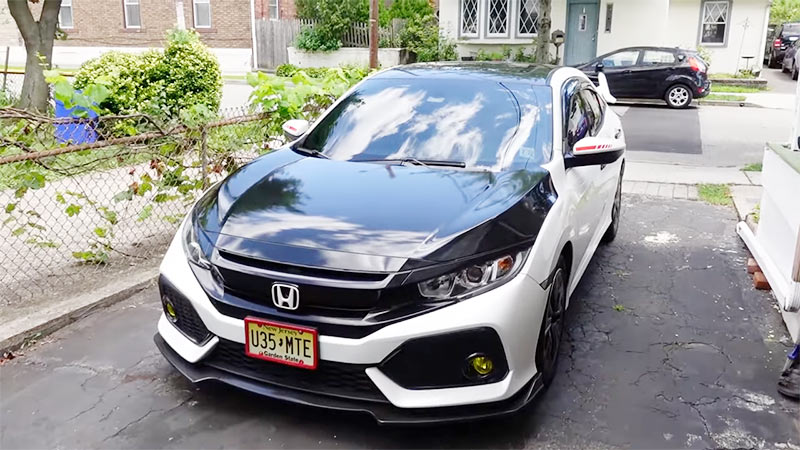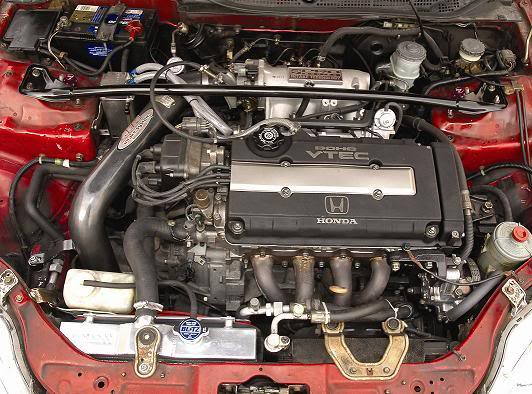To make a Honda Civic faster there are several modifications and upgrades you can consider. Here are some effective tips:
- ECU Tuning: Tuning the Civic’s Engine Control Unit (ECU) can boost speed and performance. There are various ECU tuning packages available.
- Upgrade Your Tires: Upgrading to high-performance tires can improve traction and handling resulting in better acceleration and cornering.
- Install a Cold Air Intake: Adding a cold air intake system can increase horsepower by improving airflow to the engine.
- Upgrade the Exhaust System: Installing an aftermarket catback exhaust system and header can improve exhaust flow leading to increased power and a more aggressive sound.
- Weight Reduction: Removing unnecessary weight from the vehicle can improve acceleration and overall performance. This can be done by removing stock seats and installing lighter racing buckets as well as removing any other unnecessary items.
- Performance Tune: Getting a professional tune for your Civic can optimize the engine’s performance and unlock additional power.
- Upgrade Ignition Components: Upgrading ignition components such as spark plugs and ignition coils can improve combustion efficiency and power delivery.
- Consider Forced Induction: Adding a turbocharger or supercharger to your Civic can significantly increase horsepower and torque. However this modification may require more extensive modifications and professional installation.
It’s important to note that modifying your vehicle may void warranties and can have legal implications depending on your location. Always consult with professionals and follow local regulations when making modifications to your Honda Civic.



- What are the most effective and budget-friendly modifications to increase the speed and performance of a Honda Civic without compromising its reliability and fuel efficiency?
- Are there any legal considerations or restrictions when making a Honda Civic faster? For example how do aftermarket modifications affect emissions regulations and road legality?
- Can Making My Honda Civic Faster Cause it to Overheat?
- Could you provide some guidance on the best practices for tuning and optimizing the engine and transmission to achieve a balance between speed and overall drivability in a Honda Civic?
- Helpful Resources
What are the most effective and budget-friendly modifications to increase the speed and performance of a Honda Civic without compromising its reliability and fuel efficiency?
There are several effective and budget-friendly modifications that can increase the speed and performance of a Honda Civic without compromising its reliability and fuel efficiency. Here are some of the most popular ones:
- Exhaust system modification: Upgrading the exhaust system can help improve airflow and engine performance resulting in better acceleration and more power.
- Engine tuning: Tuning the engine with a performance tuner or programmer can increase horsepower and torque output resulting in better acceleration and overall performance. Hondata and KTuner are two popular options for Honda Civics.
- Cold air intake: Installing a cold air intake system can improve airflow to the engine resulting in better performance and fuel efficiency.
- Suspension lowering kit: Lowering the suspension can improve handling and reduce body roll resulting in better overall performance.
- Performance downpipe: Replacing the stock downpipe with a performance downpipe can improve exhaust flow and increase horsepower and torque output.
It’s important to note that while these modifications can improve performance they should be done carefully and with consideration for the car’s overall reliability and fuel efficiency. It’s also important to stay within a reasonable budget and not overspend on modifications that may not provide significant benefits.
Are there any legal considerations or restrictions when making a Honda Civic faster? For example how do aftermarket modifications affect emissions regulations and road legality?
When it comes to making a Honda Civic faster through aftermarket modifications there are several legal considerations and restrictions to keep in mind. Here are some key points to consider:
- Emissions Regulations: Aftermarket modifications that affect emissions control systems such as removing or tampering with catalytic converters can violate emissions regulations. In the United States for example the Clean Air Act prohibits tampering with emission control devices. It’s important to ensure that any modifications comply with local emissions regulations to avoid legal issues.
- Road Legality: Some modifications may affect the road legality of a vehicle. For example modifications that alter the vehicle’s height lighting or exhaust noise levels may not comply with local laws and regulations. It’s important to research and understand the specific regulations in your area regarding modifications to ensure compliance with road legality requirements.
- State-Specific Regulations: Different states may have specific regulations regarding vehicle modifications. For example California has stricter emissions regulations known as California Air Resources Board (CARB) standards which require CARB-compliant aftermarket replacement catalytic converters for certain vehicles. It’s important to be aware of any state-specific regulations that may apply to your vehicle.
- Insurance Considerations: Some modifications may affect your insurance coverage. It’s important to inform your insurance provider about any modifications you make to your vehicle to ensure that you have appropriate coverage. Failure to disclose modifications could potentially result in denied claims or policy cancellation.
- Safety Considerations: While not directly related to legality it’s important to consider the safety implications of aftermarket modifications. Modifications that significantly alter the performance or handling of a vehicle should be done with caution and may require additional safety measures to ensure the vehicle remains safe to drive.
It’s important to consult local laws regulations and experts in your area to ensure that any modifications you make to your Honda Civic comply with legal requirements and do not compromise safety or emissions regulations.
Can Making My Honda Civic Faster Cause it to Overheat?
Yes, making modifications to increase the speed of your Honda Civic can lead to overheating. Some common due to modifications include a lack of proper cooling or an increase in engine strain. It’s important to consider these factors when making changes to your vehicle.
Could you provide some guidance on the best practices for tuning and optimizing the engine and transmission to achieve a balance between speed and overall drivability in a Honda Civic?
To achieve a balance between speed and overall drivability in a Honda Civic here are some best practices for tuning and optimizing the engine and transmission:
- Engine Tuning:
- Consider upgrading the air intake system to improve airflow and increase horsepower.
- Install a performance exhaust system to enhance exhaust flow and improve engine efficiency.
- Upgrade the engine management system with a programmable ECU (Engine Control Unit) to optimize fuel and ignition timing for better performance.
- Fine-tune the engine parameters such as air-fuel ratio ignition timing and camshaft timing to maximize power and drivability.
- Transmission Tuning:
- Upgrade to a short-throw shifter for quicker and more precise gear changes.
- Consider installing a limited-slip differential to improve traction and handling during acceleration and cornering.
- Optimize the gear ratios by changing the final drive ratio or installing a close-ratio gearbox for improved acceleration and top speed.
- Suspension and Handling:
- Upgrade the suspension components such as springs shocks and sway bars to improve handling and reduce body roll.
- Consider installing performance brakes for better stopping power and heat dissipation.
- Upgrade the tires to high-performance ones with better grip and traction.
- Weight Reduction:
- Remove unnecessary weight from the vehicle such as spare tire rear seats or sound deadening material to improve acceleration and handling.
- Professional Tuning:
- Consult with a professional tuner who specializes in Honda Civics to get a custom tune that is tailored to your specific modifications and goals.
- A professional tuner can optimize the engine and transmission parameters for the best balance between speed and drivability.
It’s important to note that modifying and tuning a vehicle can have an impact on its warranty and may require additional maintenance and care. It’s recommended to research and consult with experts before making any modifications to ensure they are done correctly and safely.
Helpful Resources
- https://www.hotcars.com/ways-to-make-your-honda-civic-faster/
- https://backyardbuildz.com/top-10-effective-tips-to-make-a-honda-civic-fast/
- https://www.procivic.com/pages-honda_civic_tuning/index.html
- https://itstillruns.com/make-honda-civic-faster-6768596.html
- https://hondatheotherside.com/how-to-make-a-civic-fast/
- https://autorideup.com/why-does-my-honda-civic-keep-overheating/
